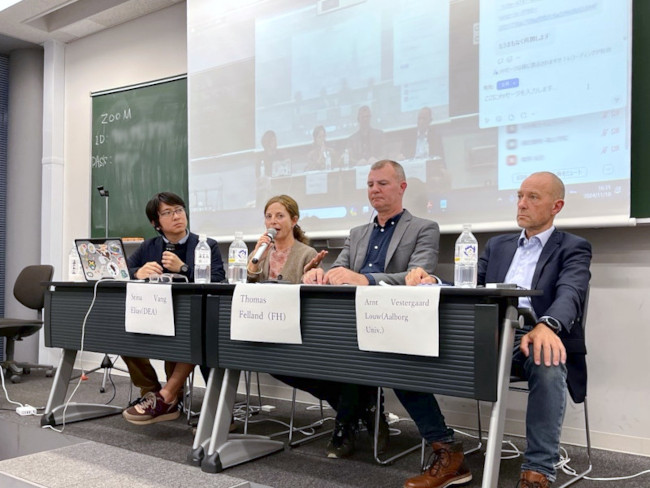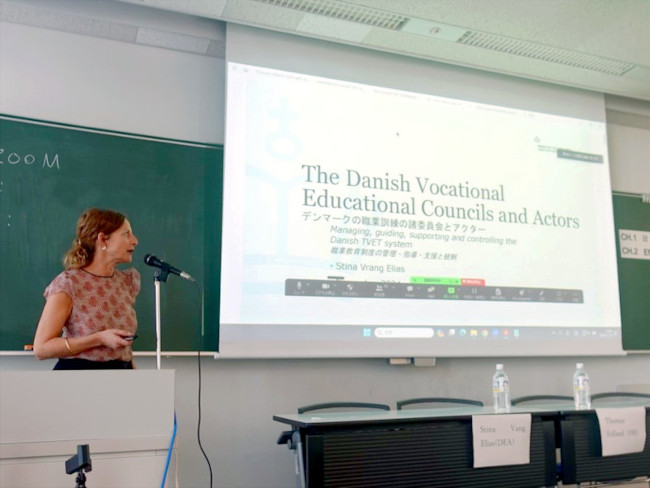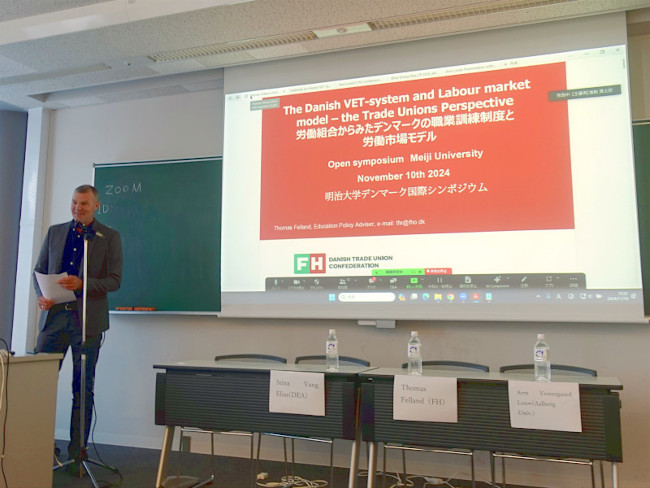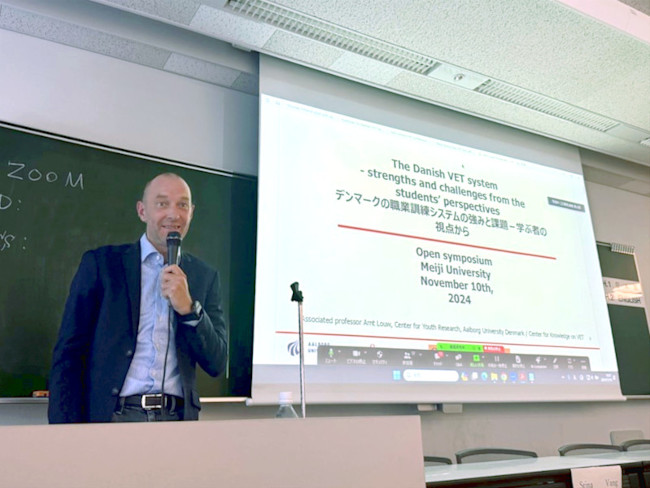[School of Political Science and Economics] Holds international symposium titled “What can we learn from reskilling in Denmark”
Dec. 17, 2024

Scene of the panel discussion From left: Associate Professor KURACHI, Ms. Elias, Mr. Felland, and Mr. Louw
On Sunday, November 10, KURACHI Shintaro, an Associate Professor of the School of Political Science and Economics of Meiji University, and SUGANUMA Takashi, a Professor of the College of Economics of Rikkyo University, jointly hosted an international symposium, “What can we learn from reskilling in Denmark”, at Surugadai Campus (co-sponsored by the Department of Economics, the School of Political Science and Economics, Meiji University, supported by the Royal Danish Embassy, Japan, and the Japan-Denmark Society). This symposium was held as part of the results report of the Grants-in-Aid for Scientific Research project, “Denmark as an innovative welfare state: Research on the institutional basis of the sustainability of the welfare state ”.
In the new form of capitalism, reskilling has attracted increasing attention in recent years. In Denmark, a labor market policy called flexicurity, which combines flexibility in the labor market with a social safety net, has been introduced. The Danish way of working is attracting attention both at home and abroad. In this symposium, we invited experts and researchers in labor market policy in Denmark to talk about the forefront of reskilling in Denmark and to discuss it from a comparative perspective with Japan.
At the beginning, Associate Professor KURACHI, the coordinator of this symposium, explained the purpose of this international symposium and gave a basic explanation on Danish labor market policy and vocational training system.
The first speaker, Ms. Stina Elias (Chairperson of the Danish Central Vocational Training Board and President of Tænketanken DEA ), explained that organizational networks such as industry and district committees that support a wide variety of vocational training programs are functioning in Denmark and that workers and employers cooperate to create a vocational training system based on the Dual System that combines classroom learning and practical training. Ms. Elias emphasized that there is a mechanism to respond flexibly according to the interests and future vision of the trainees of the vocational training system.

Lecture by Ms. Elias
The second speaker, Mr. Thomas Felland (FH: Fagbevægelsens Hovedorganisation (formerly LO National Labor Union Organization )), explained how labor unions are involved in the development and management of vocational training system; vocational training through the tripartite agreement between government, labor, and management; and how companies and unions work together to fund training costs and wages. Mr. Felland also highlighted challenges in the Danish labor market, including a shortage of vocational trainees, certain skilled technicians, vocational trainers and places, and discussed measures such as increasing the budget for vocational training and strengthening incentives. He also introduced the Green Tripartite Agreement (securing funds for green technology promotion), which has been agreed and negotiated in recent years.

Lecture by Mr. Felland
The third speaker, Mr. Arnt Vestergaard Louw (Associate Professor, Aalborg University), explained the actual situation of the Dual Model, a vocational training system in Denmark, from the perspective of a researcher based on the results of interviews and qualitative research conducted at the site. He emphasized that by alternating classroom learning and practical site training, people can gain an integrated understanding of theory and practice, and by experiencing work as a professional, they can participate in the site community with a sense of responsibility for the work that will be done for future generations. However, he said that at present, there is a problematic gap between classroom learning and practical site training, so it is necessary to take the students’ point of view and build a practical site training system that will increase students’ motivation.

Lecture by Mr. Louw
In the second half of the symposium, participants and speakers held a question-and-answer session to discuss why the tripartite agreement is possible, the mechanism of the Dual System, the relationship between the Green Tripartite Agreement and green jobs and decarbonization, and suggestions for Japan.
Among his suggestions for Japan in particular, Mr. Louw said that it is necessary to learn and apply principles rather than systems, since the systems in Japan and Denmark are very different; that pride in Japan’s advanced craftsmanship should be maintained; and that it is important to build a relationship of trust between labor and management, and the benefits of cooperation should be found.
Ms. Elias also mentioned that we should consider taking advantage of the security advantages of Japanese society, viewing the workplace as a place for lifelong learning, and promoting diversity.
Finally, Professor SUGANUMA, one of the hosts of this symposium, gave a closing address. He noted the advantages of the Danish system in that there is a central control for vocational training policy within the national government, which can flexibly change programs to meet social needs, and that labor unions and companies have a strong sense of responsibility for vocational training. He said that in Japan as well, trade unions need to be involved not only in in-house training but also in improving the skills of society as a whole, management organizations need to have a view of society as a whole, and the government’s vocational training policy needs to be reformed through a labor and management partnership.
Mr. MORISHIMA Kazuyuki , a first-year student of the master’s program in the Graduate School of Political Science and Economics at Meiji University, who attended the symposium, spoke as follows: “I was surprised by Denmark’s extensive vocational training system and the differences between Denmark and Japan. In particular, Mr. Felland’s comment on the importance of labor-management cooperation rather than labor-management conflict was thought-provoking. Mr. Louw’s comment, ‘Instead of copying systems and institutions, I want Japanese people to learn the principles behind them.’ was also striking. I also became interested in the state of labor unions in Japan.”


